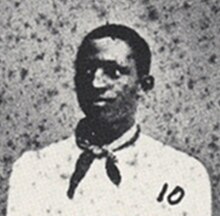| Weldy Walker | |
|---|---|
 Weldy Walker cropped from portrait of the 1881 Oberlin College baseball team | |
| Outfielder / Third baseman / Catcher | |
| Born: July 27, 1860 Steubenville, Ohio, U.S. | |
| Died: November 23, 1937 (aged 77) Steubenville, Ohio, U.S. | |
Batted: Unknown Threw: Right | |
| MLB debut | |
| July 15, 1884, for the Toledo Blue Stockings | |
| Last MLB appearance | |
| August 6, 1884, for the Toledo Blue Stockings | |
| MLB statistics | |
| Games played | 5 |
| Batting average | .222 |
| Hits | 4 |
| Stats at Baseball Reference | |
| Teams | |
Weldy Wilberforce Walker (July 27, 1860 – November 23, 1937), sometimes known as Welday Walker and W. W. Walker, was an American baseball player. In 1884, he became the third African American to play Major League Baseball.
Walker played at Oberlin College and the University of Michigan. In July 1884, he joined the Toledo Blue Stockings of the American Association which was then part of Major League Baseball. His brother Moses Fleetwood Walker, commonly known as Fleetwood (or "Fleet") Walker, was the second African American to play Major League Baseball, making his debut two months before Weldy. In 1887, as racial segregation took hold in professional baseball, Weldy joined the Pittsburgh Keystones of the short-lived National Colored Base Ball League.
His March 1888 open letter to The Sporting Life protesting the racial segregation of baseball has been described as "perhaps the most passionate cry for justice ever voiced by an athlete."[1]
After retiring from baseball, Walker operated restaurants and a hotel in eastern Ohio. In 1897, he served on the Executive Committee of the Negro Protective Party, a newly formed political party established in Ohio in protest of the failure of the Republican governor to investigate the lynching of an African American in June 1897 at Urbana, Ohio. In the 1900s, Weldy and his brother Fleetwood became active in the Back-to-Africa movement and promoted emigration to Liberia. The brothers also established and edited The Equator, a black issues newspaper.
